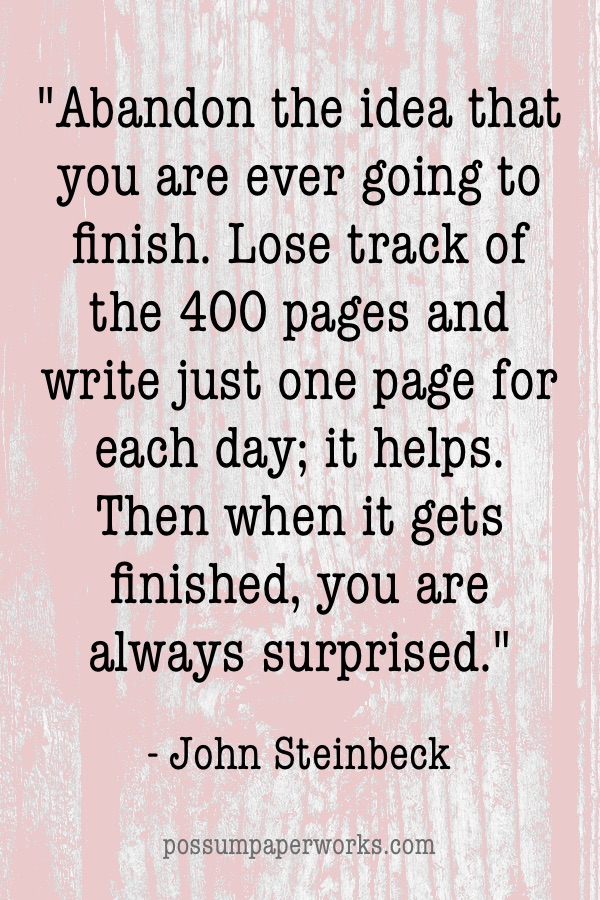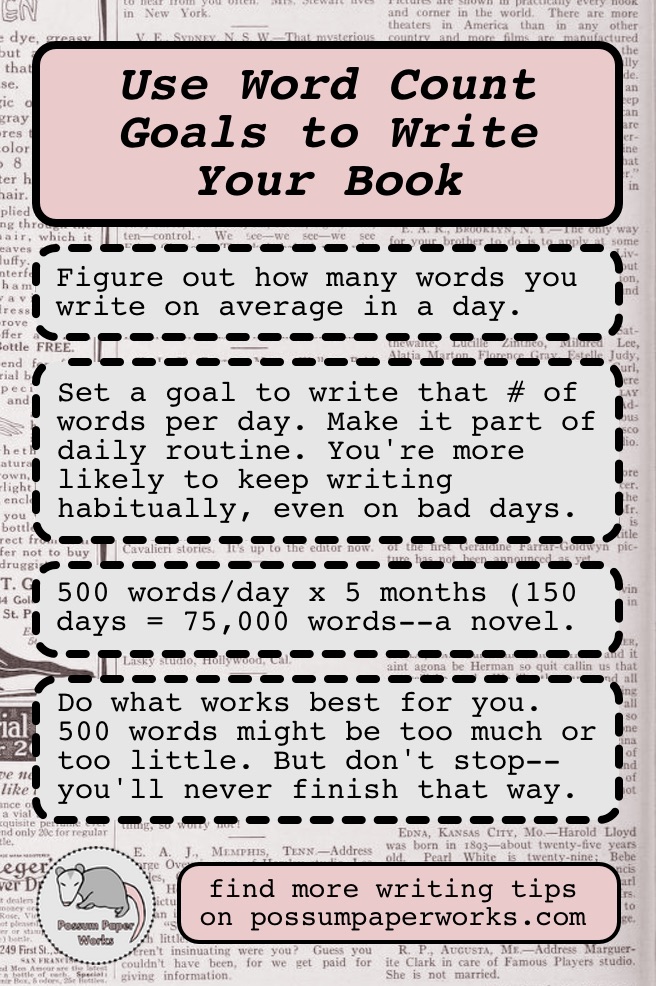
Hey there! It’s officially University Season, so between that and the upkeep of my business, I highly doubt I’ll have much time to post. That said, I have a new writing tip! It’s one I found very helpful recently – having a daily word count goal.
Writing Tip #7 – Daily Word Count Goals
Last week, I finished writing a book. Okay, it was a rough draft of a book. A very rough draft. It still has many issues to fix before anyone besides friends and family even can know about it.
But I finished, dammit. I wrote a book.
And I’m not saying that to brag (much). I’m proud, but I also want you to have to tools you need to do the same.
If you’re here, you want to know how to write better (I hope). I totally get that. I didn’t find it in me to write a real book until after I’d read dozens of other author’s works, online and in print, on how to tell a story.
All of those things helped me get to the point I am today. I learned many lessons from all–on plot, characters, form, whatever.
That said, the tools for helping with the act of writing did little for me. For whatever reasons, certain tips that other authors swear by did nothing to motivate me. I had to find my own limits and skills.
The tool that worked the best for me? Making myself write no less than a certain number of words every day.

How I Wrote A Book
Early this summer, right after my spring classes ended, I told myself that I would try to write a book. I had no real plans to speak of for the summer, so I made a daily schedule for myself–write in the morning, read in the afternoon, do tasks for this blog and my business in the evening.
Based on the total word count I expected, and a rough estimate of the number of days I had, I knew I’d have to write more than 500 words every day if I wanted to finish before classes started.
It wasn’t the first time I gave myself that task for the summer. Two years in a row, I wrote at least 500 words a day on a vague comic book script (still not even halfway done). Sure, it was vague. The rules changed as I felt like it. Not writing on the weekends? Sure, why not. On vacation? That’s fine.
I wrote. Lots of words hit the page. It worked well, and got some of my story out.
This time, I wasn’t nearly as lenient.
The Rules
500 words had to happen. Each day. Every day. No exceptions.
It’s a weekend? 500 words.
Stressed out and tired? 500 words.
Only an hour to write? 500 words.
On vacation? 500 words. Or more.
Sometimes I could barely reach that number. Sometimes I blew way past. Writing dialogue? Suddenly 1,000+ new words are on the page. Writing a bit of plot that totally lost me? Exactly 501 words written, finished at 1:30 PM.
When I started working on the project, that barely happened. I’d finish before noon each day, often with at least 600 words. After two months of straight writing, it got a whole lot harder.
Should I have taken breaks? Probably. Did I have time to? Nope.
More importantly, was I gonna break my 500 per day streak just because I had a bad day? Hell no.
Going Over the Count is Okay!
In the last month or so of writing, I realized I needed to do 750 a day to get to the total count I expected the book to finish at. But I didn’t reset my count calculators to help. So I kept writing 500. Sometimes I’d get to 750, sometimes 1,000.
It wasn’t enough.
Last week I wrote 1,500+ words for 5 days in a row.
I’m still coming off of the exhausting high of finishing my book.
But I finished.
If you’ve got the muse or the determination, don’t stop. Get it out.
Don’t Beat Yourself Up If You Miss the Goal
Okay, I have to be honest–at least with this last session, I would’ve beat myself up for not getting to 500. No matter what I say, my brain still thinks of 500 words as generously low.
It’s not.
Getting up and writing ANYTHING, be it a sentence or thirty pages, is so much more than most people will ever do.
Seriously.
I probably should’ve taken some breaks to clear my head. I didn’t. But I also had the luxury of not having many commitments while I was writing.
If I missed my goal right now, with all my other deadlines, I wouldn’t get too stressed about it. Remember, writing should have an element of love and passion, not just numerical goals all the time.
Or, to be blunt, unless you’re lucky enough to have a publisher/agent, you’re the only one who cares if you miss your goal.
Word Count Varies Per Person
The advice I see all the time is to just write. To put all the words on the page. Don’t think about it. Just do it.
That has never worked for me. I am a perfectionist. Every word must be perfect. The sentence lengths must vary. The word choice must make sense for the given character. Words and phrases can’t repeat in the same section. So on and so forth.
I can’t turn my need for perfection off, but I don’t mind anymore. I just have to work around the slow pace that results.
That means that, for the most part, the 1,667 words a day or 10,000 per weekend or whatever that NaNoWriMo requires? Not possible for me. Especially not if I do anything other than write during the day or want sleep.
And I want sleep. That much I refuse to give up for anything, good grades and writing included.
So, 500 words is my magic daily word count.
Famous Authors and their Daily Word Counts
Years ago, I found this great article and chart at Writers Write that shares the approximate daily word counts of 39 different authors, plus quotes about writing from each of them. It’s worth a look.
But with caution.
I love Ray Bradbury. Ray Bradbury wrote 1,000 words a day. I am not Ray Bradbury.
The thing is, the bulk of Bradbury’s words, especially in the early days? Those words paid him directly, thanks to the golden age of fast-paced pulp fiction where more words meant more money.
He had much more financial motivation to write more than me. The same goes for the 2,000 words Stephen King writes. No one pays me to write. I only have my own passion to drive me. Passion is great–but sometimes it needs a kick in the ass to keep up.
If you’re not a professional writer, you can’t expect yourself to meet the daily word counts of one. Especially not if you have a full time job or education that has nothing to do with writing.
Right now, the words I have time to write are limited to lab reports, blog posts, and my nightly journal entry. I simply don’t have the time or energy to write fiction. And that’s okay.
When I have the motivation to write again, I will. No matter my surroundings.
If you have the motivation to write, what are you still doing here? Go write!
What’s Your Magic Daily Word Count?
How do you know how many words you can write in a day?
Trial and error, my friend. That’s it.
See what you write when you’re feeling driven, when you can devote all your attention to your writing. See how much you write when you want to throw your computer across the room. The sweet spot for most days is probably in the middle.
As I mentioned, 500 is mine. I found out early on in writing that 2,000+ words a day? It ain’t happening. As far as I can recall, I’ve done that once. Last week. When I was pushing all of my energy into finishing by a deadline.
Most of the time? 500 is the max of what I can do in a reasonable period.
You might be able to drop 2,000 words a day like it’s nothing. More power to you. Maybe 500 is too much for you. That’s cool too.
Whatever you do, get the words out there.
!["If you write 10k [words] a day, you will end up with a book. If you write 1k a day, you will end up with a book. If you write 500 words every Tuesday, you will end up with a book. If you write 100 words before bed, or 50 whenever you can, you will end up with a book. The only way you won't end up with a book is if you quit." - VE Schwab](https://possumpaperworks.com/wp-content/uploads/2020/08/quote_schwab.jpg)
The Main Point
Find a way to get yourself to write. Some writing is better than none. If you take nothing else away from this, remember that. If you want to be a writer, you have to write.
Having a daily word count goal can make that easier.
I’m not particularly goal-driven, but if I start something, good luck getting me to stop. I’ve written in my journal every single day since May 2013. I’m stubborn. Word count streaks work for me better than anything else.
Maybe they won’t work for you. That’s fine. I hope you’re able to find the method that does motivate you. Some people do well with timed sessions. That’s not for me, but I might write a tip on that someday in the future, since it seems to help others.
The big thing is to not give up. If one way of writing doesn’t work, find another. The internet is filled with helpful hints for your perusal.
Tools to Use
If you write non-linearly like I do, find yourself an app with word count tracking built in–as in, you can see exactly how many new words you’ve written.
I use Highland 2, which lets you make a “goal” of total words, total pages, new words, or new pages, and shows you the progress as you write. I love it and hate it. It makes it easy to check how I’m doing–but also how much I have left.
NaNoWriMohas tracking tools during the month of November, and possibly year round? Like I said–writing 50,000 words in a month is not for me. Worth
A quick web search for “word counter” will also reveal dozens of free tools for counting your total word number, and there’s a couple of free apps as well for tracking.
If all else fails, make a spreadsheet! Most word processors also have ways to display your total word count. You can make a note of the count when you start, or use the total count to make milestones. Start at 213? Aim for 750, or 1,000.
Some authors track page count as an alternative. This is also great! Two double-spaced pages is usually a little more than 500 words. Most word processors can also track that.
As always, find what works for you.
About 1750 words in 2 days, in case you were wondering about this article. 😉

